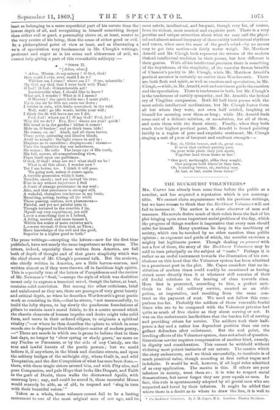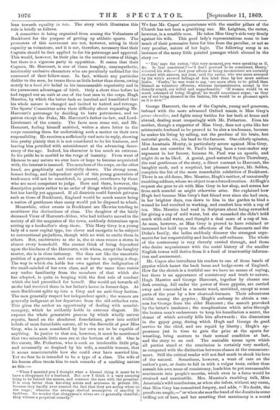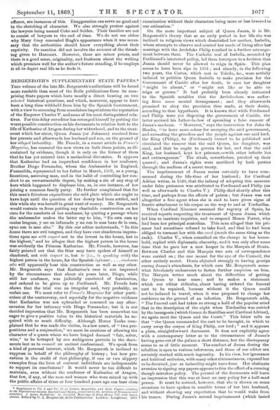THE BUCICHURST VOLUNTEERS.*
MR. CAPES has already been some time before the public as a novelist, and has acquired a reputation which is not contemp- tible. We cannot claim acquaintance with his previous writings, but we have reason to think that the Buckhurst Volunteers will not fail to increase it. The author is a close observer of men and manners. His novels derive much of their relish from the fact of his plot hinging upon some important social problem of the day, which the progress of thine renders it imperative that every man should solve for himself. Many questions lie deep in the machinery of society, which can be touched by no other sanction than public opinion ; as exponent and guide of which, the novelist exercises a mighty but legitimate power. Though dealing en passant with not a few of these, the story of the Buckhurst Volunteers may be said to turn principally on the subject of "caste." Perhaps it is rather as an useful instrument towards the illustration of his con- clusions on this head that the Volunteer system has been admitted to a prominent part in the plot. Mr. Capes considers that no in- stitution of modern times could readily be mentioned as having struck more directly than it at whatever still remains of their old feudal relations in the bearing of class towards class. Here first is presented, according to him, a perfect anti- thesis to the old military service, enacted as an obli- gation, as imperative, and resulting from the same con., tract as the payment of rent. We need not follow this com- parison too far. Probably the soldiers of those venerable feudal times who are to be compared with the Volunteer privates bad quite as much of free choice as they about serving or not. It was on the unfortunate landholders that the burden fell of serving and providing others for service. The soldiers took their half- pence a day and a rather less dependent position than our own gallant defenders after enlistment. But the real point, the levelling effects of the Volunteer system, does not admit of question. Gratuitous service requires compensation of another kind, namely, in dignity and consideration. This cannot be withheld without violating most potent instincts of our nature. The maxim which the story endeavours, and we think successfully, to inculcate is of much practical value, though sounding at first rather vague and indefinite. It would be well, however, if all legal rules admitted of as easy application. The maxim is this. If others are your inferiors in society, treat them so ; it is wise to respect social demarcations, but never forget they are your equals as men. In fact, this rule is spontaneously adopted by all genial men who are respected and loved by their inferiors. It might be added that where there is a doubt as to where to draw the line, it is well to • The Buckhurst Volunteers. By J. M. Capes, MA. London: Tinsley Brothers. lean towards equality in tote. The story which illustrates this rule is briefly as follows.
A committee is being organized from among the Volunteers of Buckhurst for the purpose of getting up athletic sports. The promoters of this movement are not, however, acting in their capacity as volunteers, and it is not, therefore, necessary that their Captain should be first applied to for his patronage and approval. This would, however, be their plan in the natural course of things, but there is a vigorous party in opposition. It seems that their Captain, Mr. Harcourt, is one of those haughty, unsympathetic, intolerably exclusive characters who are peculiarly unfitted for the command of their fellow-men. In fact, without any particular dislike to the men, he treats them as little better than slaves, owing merely to a bond Jude belief in his immeasurable superiority and in the paramount advantages of birth. Only a short time before he had rapped out an oath at one of the best men in the corps, Hugh Maurice, by which the latter feels so insulted and humiliated that his whole nature is changed and incited to hatred and revenge. The Sports' Committee solve their difficulty about requesting Mr. Harcourt's patronage by deciding to have patronesses, and no patron except the Duke, Mr. Harcourt's father-in-law, and Lord- Lieutenant of the county. The facts soon come out, and Mr. Harcourt, feeling himself snubbed, writes a stern letter to the corps censuring them for undertaking such a matter on their own responsibility. He receives a sufficiently cool note in reply, showing him pretty plainly that it is not considered to be his business, and leaving him petrified with astonishment at the advancing demo- cracy of the age. Indeed, his character is too much an extreme. In his pride he is morbid to the verge of insanity. From want of likeness to any nature we ever have or hope to become acquainted with, the interest is lessened. The members of the corps, on the other hand, are graphically and truthfully drawn. The strong sense, honest feeling, and independent spirit of this young generation of tradesmen will not be considered, in general, overdrawn by those who are most competent to judge. Here and there, however, the description points rather to an order of things which is promising, but has hardly yet appeared. If all districts could furnish privates such as those of Buckhurst, England would be much nearer being a nation of gentlemen than many would yet be disposed to admit.
Meanwhile, other events in Buckhurst are likewise tending to overthrow the distinctions of class. The daughter of the lately deceased Vicar of Harcourt-Abbas, who had hitherto moved in the society of all the magnates of the town, suddenly determines upon setting up a bookseller's shop there. This Mary Grey is a young lady of a most capital type, too clever and energetic to be subject to conventional prejudices, though with no wish to excite them in others. But, unobtrusive as she is, she at once rouses a storm in almost every household. She cannot think of being dependent upon the kindness of the Harcourts, with whom, except the haughty master, she is in close intimacy. She does not like the uncertain position of a governess, and can see no harm in opening a shop. The way in which she holds her own against the indignation of the small-minded of her own class, and at the same time resists any undue familiarity from the members of that which she has adopted, is quite in keeping with the first rule of conduct which she had prescribed for herself. She would act towards all as she had received them in her father's house in former days. At once Buckhurst splits up into a Grey and an anti-Grey faction. The men generally respect her independent spirit ; the women are generally indignant at her departure from the old orthodox ruts. This gives the author an opportunity of dealing with scandal- mongery, which he evidently holds in extreme disgust. He exposes the whole generative process by which wholly untrue reports, based on the slenderest foundations, grow into settled beliefs of most formidable nature, all to the discredit of poor Miss Grey, who is soon considered by her own sex to be capable of anything. In justice to that sex, however, it must be mentioned that two miserable little men are at the bottom of it all. One is the curate, Mr. Petherton, who is such an intolerable little prig, and necessarily so despised by his wife, a sensible woman, that it seems unaccountable how she could ever have married him. Yet we fear he is intended to be a type of a class. The wife of his bosom often treats him to such remarks of a soothing nature as this :—
"When I married you I thought what a blessed thing it must be to have a clergyman for a husband. But now I think it a very amusing thing to be behind the scenes, and contrast the man with the preacher. It is even better than knowing actors and actresses in private life, because they hardly ever conceal the fact that they are acting when on the stage; whereas the average clerical assumption of sanctity is faultless. No wonder that clergymen's wives arc so generally cheerful ; they witness a perpetual comedy."
We fear Mr. Capes' acquaintance with the smaller pillars of the Church has not been a gratifying one. Mr. Leighton, the rector, however, is a sensible man. He takes Miss Grey's aide very firmly against his wife. This good lady's representations seem to lose much of their persuasive force for him from the peculiar, or not so very peculiar, nature of her logic. The following scrap is an instance of the many little pointed passages which abound in the story :—
" 'Yet,' says the rector, 'this very momentym were speaking as if, itc. Is that consistent?'—' I don't pretend to be consistent, Henry,' retorted his wife.—' And your efforts at being inconsistent are certainly crowned with success, my dear,' said the rector, who was more annoyed by his wife's avowed failings of this kind than by her more Barlow. faults. 'Faults,' he was wont to say, 'are more often to be pitied than blamed as voluntary offences; whereas inconsistencies, except in the- densely stupid, are wilful and unpardonable.' If women would be as much ashamed of being illogical,' he would sometimes argue, 'as they are of not being dressed in the fashion, life would be as pleasant again as it is now.'"
George Harcourt, the son of the Captain, young and generous,. imbued with the more advanced Oxford tenets, is Miss Grey's- preux chevalier, and fights many battles for her both at home and abroad, dealing most unsparingly with Mr. Petherton. Even his mother, though a supporter of Miss Grey, does not quite like her- aristocratic husband to be proved to be also a tradesman, because he makes his living by selling, not the produce of his brain, but,. materialgoods, viz., his land to the farmers. One elderly spinster,.
Miss Anastasia Munby, is particularly severe against Mass Grey, and does not consider St. Paul's having been a tent-maker any argument in her favour, because St. Paul was an apostle, and might do as he liked. A genial, good-natured Squire Thornbury, the real gentleman of the story, a direct contrast to Harcourt, the- haughty snob, and a sceptical, but pleasant lawyer, Mr. Selden, complete the list of the more remarkable celebrities of Buckhurst. There is an old dame, Mrs. Maurice, Hugh's mother, of unnaturally rambling address, whom we object to as a forced creation. At Hugh's. request she goes to sit with Miss Grey in her shop, and screen her from such scandal as might otherwise arise. She explained how Hugh had become Miss Grey's fast friend aver since she had once, in her brighter days, run down to him in the garden to bind a wound he had received in working, and comfort him with a cup of tea. Mrs. Maurice had read in Scripture about being rewarded for giving a cup of cold water, but she remarked she didn't hold much with cold water, and thought a deal more of a cup of tea. As soon, however, as Miss Grey is proved to have retained or increased her hold upon the affections of the Harcourts and the Duke's family, the ladies suddenly discover the strongest argu- ments for her respectability and laudable self-reliance. The whole of the controversy is very cleverly carried through, and those who desire acquaintance with the social history of the smaller English towns will derive from it a fund of trustworthy informa- tion and amusement.
Mr. Capes also introduces his readers to one of those bands of gypsies which haunt the back lanes and hedge-rows of England. How far the sketch is a truthful one we have no means of saying, but there is an appearance of consistency and truth to nature. Hugh Maurice and George Harcourt, together by chance one dark evening, fall under the power of these gypsies, are carried away and concealed in a remote wood, unvisited, except at some parts of the year by a few charcoal-burners. Their adventures whilst among the gypsies ; Hugh's embassy to obtain a ran- som for George from the elder Harcourt ; the assault provoked by the latter's insolence ; the complications which arise through the beaten man's endeavours to keep his humiliation a secret, the shame of which actually kills him afterwards ; the dissensions.
in the gypsy gang, during which Hugh and George do good service to the chief, and are repaid by liberty ; Hugh's ap- pearance just in time to gain the prize at the sports for wrestling, bring matters to their normal condition at last,. and the story to an end. The amicable terms upon which all parties stand at the conclusion is certainly very marked, as compared with the distinction between classes at the commence- ment. Still the critical reader will not find much to shock his love of the natural. Sometimes, however, a want of care on the author's part, or desire to fall in with a vulgar taste, rather than consult his own sense of consistency, leads him to put unreasonable sentiments into people's mouths, which even in a farce would be strained and unscientific. Mrs. Maurice's rambling talk, Miss Anastasia's wild conclusions, as when she infers, without any cause, that Miss Grey has committed forgery, and adds, "No doubt, the proofs are ample,—" or when she sees the hand of the Jesuits in some trifling act of hers, and her asserting that matrimony is a moral 'offence, are instances of this. Exaggeration can serve no good end in the sketching of character. We also strongly protest against the lawyers being named Coke and Selden. Their families are not to consist of lawyers to the end of time. We do not see either why Mary Grey concealed Hugh's appearance when it was neces- sary that the authorities should know everything about their captivity. Its mention did not involve the account of the thrash- ing given to Harcourt. However, these are minor points, and there is a good sense, originality, and freshness about the writing which promises well for the author's future standing, if he employs it all to depict real life as he finds it.
































 Previous page
Previous page